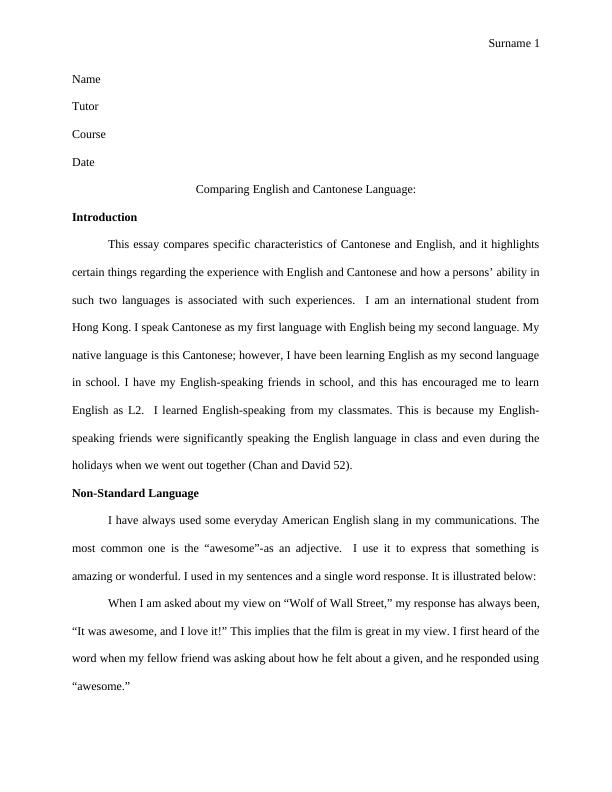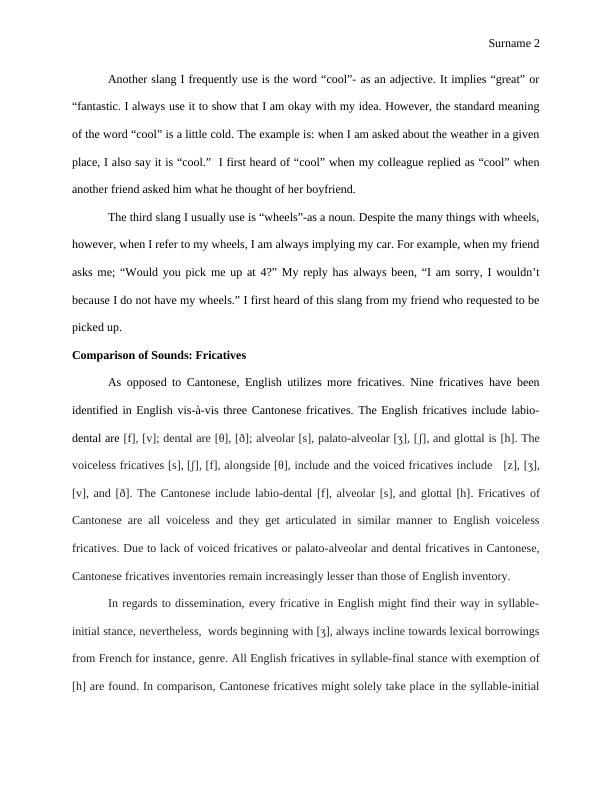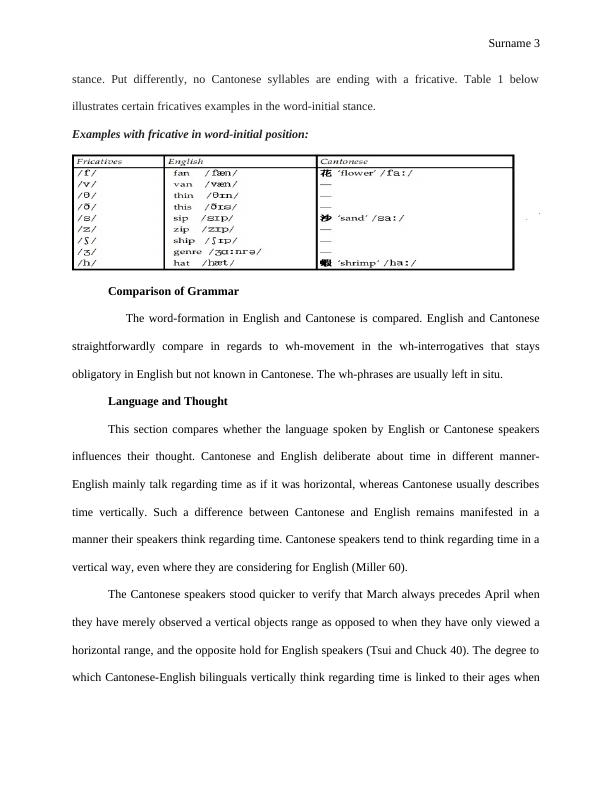Comparing English and Cantonese Language
Comparing the author's experiences with English, French, and German languages and their abilities in these languages.
9 Pages2485 Words21 Views
Added on 2023-03-23
About This Document
This essay compares specific characteristics of Cantonese and English, and it highlights certain things regarding the experience with English and Cantonese and how a persons’ ability in such two languages is associated with such experiences.
Comparing English and Cantonese Language
Comparing the author's experiences with English, French, and German languages and their abilities in these languages.
Added on 2023-03-23
ShareRelated Documents
Surname 1
Name
Tutor
Course
Date
Comparing English and Cantonese Language:
Introduction
This essay compares specific characteristics of Cantonese and English, and it highlights
certain things regarding the experience with English and Cantonese and how a persons’ ability in
such two languages is associated with such experiences. I am an international student from
Hong Kong. I speak Cantonese as my first language with English being my second language. My
native language is this Cantonese; however, I have been learning English as my second language
in school. I have my English-speaking friends in school, and this has encouraged me to learn
English as L2. I learned English-speaking from my classmates. This is because my English-
speaking friends were significantly speaking the English language in class and even during the
holidays when we went out together (Chan and David 52).
Non-Standard Language
I have always used some everyday American English slang in my communications. The
most common one is the “awesome”-as an adjective. I use it to express that something is
amazing or wonderful. I used in my sentences and a single word response. It is illustrated below:
When I am asked about my view on “Wolf of Wall Street,” my response has always been,
“It was awesome, and I love it!” This implies that the film is great in my view. I first heard of the
word when my fellow friend was asking about how he felt about a given, and he responded using
“awesome.”
Name
Tutor
Course
Date
Comparing English and Cantonese Language:
Introduction
This essay compares specific characteristics of Cantonese and English, and it highlights
certain things regarding the experience with English and Cantonese and how a persons’ ability in
such two languages is associated with such experiences. I am an international student from
Hong Kong. I speak Cantonese as my first language with English being my second language. My
native language is this Cantonese; however, I have been learning English as my second language
in school. I have my English-speaking friends in school, and this has encouraged me to learn
English as L2. I learned English-speaking from my classmates. This is because my English-
speaking friends were significantly speaking the English language in class and even during the
holidays when we went out together (Chan and David 52).
Non-Standard Language
I have always used some everyday American English slang in my communications. The
most common one is the “awesome”-as an adjective. I use it to express that something is
amazing or wonderful. I used in my sentences and a single word response. It is illustrated below:
When I am asked about my view on “Wolf of Wall Street,” my response has always been,
“It was awesome, and I love it!” This implies that the film is great in my view. I first heard of the
word when my fellow friend was asking about how he felt about a given, and he responded using
“awesome.”

Surname 2
Another slang I frequently use is the word “cool”- as an adjective. It implies “great” or
“fantastic. I always use it to show that I am okay with my idea. However, the standard meaning
of the word “cool” is a little cold. The example is: when I am asked about the weather in a given
place, I also say it is “cool.” I first heard of “cool” when my colleague replied as “cool” when
another friend asked him what he thought of her boyfriend.
The third slang I usually use is “wheels”-as a noun. Despite the many things with wheels,
however, when I refer to my wheels, I am always implying my car. For example, when my friend
asks me; “Would you pick me up at 4?” My reply has always been, “I am sorry, I wouldn’t
because I do not have my wheels.” I first heard of this slang from my friend who requested to be
picked up.
Comparison of Sounds: Fricatives
As opposed to Cantonese, English utilizes more fricatives. Nine fricatives have been
identified in English vis-à-vis three Cantonese fricatives. The English fricatives include labio-
dental are [f], [v]; dental are [θ], [ð]; alveolar [s], palato-alveolar [ʒ], [ʃ], and glottal is [h]. The
voiceless fricatives [s], [ʃ], [f], alongside [θ], include and the voiced fricatives include [z], [ʒ],
[v], and [ð]. The Cantonese include labio-dental [f], alveolar [s], and glottal [h]. Fricatives of
Cantonese are all voiceless and they get articulated in similar manner to English voiceless
fricatives. Due to lack of voiced fricatives or palato-alveolar and dental fricatives in Cantonese,
Cantonese fricatives inventories remain increasingly lesser than those of English inventory.
In regards to dissemination, every fricative in English might find their way in syllable-
initial stance, nevertheless, words beginning with [ʒ], always incline towards lexical borrowings
from French for instance, genre. All English fricatives in syllable-final stance with exemption of
[h] are found. In comparison, Cantonese fricatives might solely take place in the syllable-initial
Another slang I frequently use is the word “cool”- as an adjective. It implies “great” or
“fantastic. I always use it to show that I am okay with my idea. However, the standard meaning
of the word “cool” is a little cold. The example is: when I am asked about the weather in a given
place, I also say it is “cool.” I first heard of “cool” when my colleague replied as “cool” when
another friend asked him what he thought of her boyfriend.
The third slang I usually use is “wheels”-as a noun. Despite the many things with wheels,
however, when I refer to my wheels, I am always implying my car. For example, when my friend
asks me; “Would you pick me up at 4?” My reply has always been, “I am sorry, I wouldn’t
because I do not have my wheels.” I first heard of this slang from my friend who requested to be
picked up.
Comparison of Sounds: Fricatives
As opposed to Cantonese, English utilizes more fricatives. Nine fricatives have been
identified in English vis-à-vis three Cantonese fricatives. The English fricatives include labio-
dental are [f], [v]; dental are [θ], [ð]; alveolar [s], palato-alveolar [ʒ], [ʃ], and glottal is [h]. The
voiceless fricatives [s], [ʃ], [f], alongside [θ], include and the voiced fricatives include [z], [ʒ],
[v], and [ð]. The Cantonese include labio-dental [f], alveolar [s], and glottal [h]. Fricatives of
Cantonese are all voiceless and they get articulated in similar manner to English voiceless
fricatives. Due to lack of voiced fricatives or palato-alveolar and dental fricatives in Cantonese,
Cantonese fricatives inventories remain increasingly lesser than those of English inventory.
In regards to dissemination, every fricative in English might find their way in syllable-
initial stance, nevertheless, words beginning with [ʒ], always incline towards lexical borrowings
from French for instance, genre. All English fricatives in syllable-final stance with exemption of
[h] are found. In comparison, Cantonese fricatives might solely take place in the syllable-initial

Surname 3
stance. Put differently, no Cantonese syllables are ending with a fricative. Table 1 below
illustrates certain fricatives examples in the word-initial stance.
Examples with fricative in word-initial position:
Comparison of Grammar
The word-formation in English and Cantonese is compared. English and Cantonese
straightforwardly compare in regards to wh-movement in the wh-interrogatives that stays
obligatory in English but not known in Cantonese. The wh-phrases are usually left in situ.
Language and Thought
This section compares whether the language spoken by English or Cantonese speakers
influences their thought. Cantonese and English deliberate about time in different manner-
English mainly talk regarding time as if it was horizontal, whereas Cantonese usually describes
time vertically. Such a difference between Cantonese and English remains manifested in a
manner their speakers think regarding time. Cantonese speakers tend to think regarding time in a
vertical way, even where they are considering for English (Miller 60).
The Cantonese speakers stood quicker to verify that March always precedes April when
they have merely observed a vertical objects range as opposed to when they have only viewed a
horizontal range, and the opposite hold for English speakers (Tsui and Chuck 40). The degree to
which Cantonese-English bilinguals vertically think regarding time is linked to their ages when
stance. Put differently, no Cantonese syllables are ending with a fricative. Table 1 below
illustrates certain fricatives examples in the word-initial stance.
Examples with fricative in word-initial position:
Comparison of Grammar
The word-formation in English and Cantonese is compared. English and Cantonese
straightforwardly compare in regards to wh-movement in the wh-interrogatives that stays
obligatory in English but not known in Cantonese. The wh-phrases are usually left in situ.
Language and Thought
This section compares whether the language spoken by English or Cantonese speakers
influences their thought. Cantonese and English deliberate about time in different manner-
English mainly talk regarding time as if it was horizontal, whereas Cantonese usually describes
time vertically. Such a difference between Cantonese and English remains manifested in a
manner their speakers think regarding time. Cantonese speakers tend to think regarding time in a
vertical way, even where they are considering for English (Miller 60).
The Cantonese speakers stood quicker to verify that March always precedes April when
they have merely observed a vertical objects range as opposed to when they have only viewed a
horizontal range, and the opposite hold for English speakers (Tsui and Chuck 40). The degree to
which Cantonese-English bilinguals vertically think regarding time is linked to their ages when

End of preview
Want to access all the pages? Upload your documents or become a member.
Related Documents
CROSS CULTURE COMMUNICATION ARTICLE 2022lg...
|7
|1679
|26
